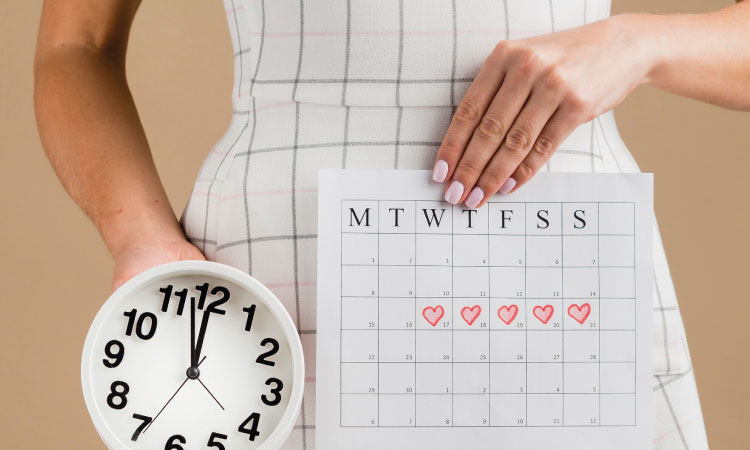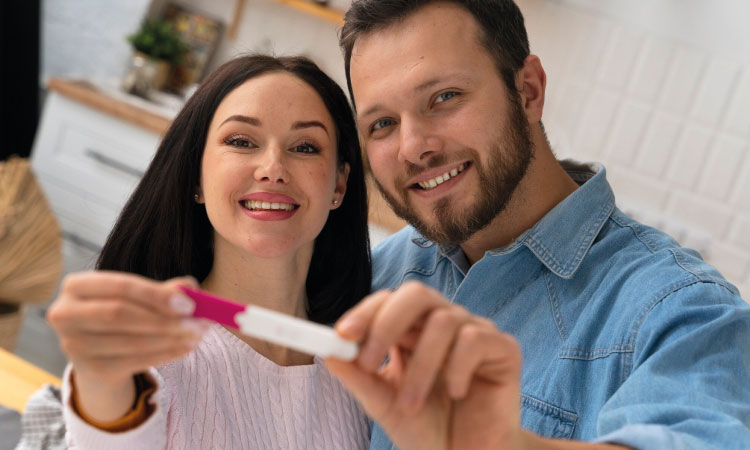When attempting to conceive, it is common to experience some level of anxiety. If they are currently undergoing fertility treatments, the anticipation of waiting to discover the outcome of the procedure can feel like an endless period for couples. It can be tough for some women to go through this phase. Approximately six days after fertilization, the fertilized egg implants into the lining of the endometrium in the uterus.It could take another five to seven days, though, to get an accurate positive pregnancy test1.
The Two-Week Wait (TWW) is a very important time for people who are trying to get pregnant. This usually takes place after ovulation but before the expected start of their period. Women/Couples trying to conceive become very alert to any signs of pregnancy around this time. It could be a very emotional and tense time, full of worry and anticipation. To learn more about the common Two-Week Wait symptoms (TWWs), continue reading this blog, which describes two-week wait symptoms day by day.
Some Reflections On The Two-Week Wait Symptoms
The symptoms experienced during the Two-Week Wait (TWW) are not consistent and can differ significantly from one person to another. It is important to remember that not everyone will experience the same set of symptoms during this time, even though many people may experience some common early pregnancy symptoms.
Because everyone’s body is different, the way it reacts to pregnancy or changes in hormones can also be different. Some women may have a higher sensitivity to these hormone changes and may detect pregnancy symptoms earlier, whereas others do not experience any noticeable symptoms at all during the two week wait.
There is no guarantee that the wait time will be two weeks either. There are 14 days between conception and your period, which is the “two-week wait.” In addition, keep in mind that the two-week wait is based on a normal 28-day cycle and may not work for all women.
To be exact, some cycles can last only 21 days, while others can last up to 35 days. Further, if you are using assisted reproductive technologies like IUI or IVF, the waiting period could be as short as nine days or as long as a little over two weeks.
Calculate Due Date With Conception Date
Related Reading: What Are The Symptoms After Ovulation If Not Pregnant?
A Comprehensive Two Week Wait for Symptoms (Twws) Day-Day Guide
Couples or women who are trying to conceive may feel a strong desire to take a home pregnancy test before their expected period date. However, it is important to note that most home pregnancy tests may not provide accurate results until after a person has missed their period.
Your body will not be producing enough beta-hCG (also called the pregnancy hormone) in your urine or blood to detect pregnancy until after this two-week waiting period. This means that even if you do not get a positive pregnancy test result, you can still be pregnant.
When talking about TWW day-by-day signs, you need to know what “DPO” means. “TWW” stands for “Two-Week Wait,” and “DPO” stands for “Days Past Ovulation.” They are connected, but they mean slightly different things. While DPO is a number that tells you how many days have passed since ovulation, TWW is an idea that refers to the whole time between ovulation and when your next period is supposed to start.
The TWW is nothing but monitoring DPO, with a focus on the two-week window that is most important for individuals wanting to conceive. Here’s a day-by-day guide to understanding the common Two-Week Wait Symptoms (TWWs):
Related Reading: Can You Reuse Pregnancy Kits At Home?
Day 1-3 post-ovulation (DPO 1-3)

The luteal phase of a woman’s menstrual cycle begins after she ovulates. This stage lasts until either menstruation begins or the fertilized egg implants in the uterine wall. DPO 1-3 represents the early days following ovulation.
These days are very important for fertility and conception. In the event of fertilization, which occurs anywhere from 12 to 24 hours after ovulation2, the egg, now known as a zygote, begins to divide and grow into a ball of cells. It then makes its way to the uterus via the fallopian tube. DPO 1-3 marks the beginning of the “two-week wait” (TWW).
At this point in the TWW, the fertilized egg has not yet been implanted into the uterine lining, so it is too early for noticeable symptoms.
Day 4-5 post-ovulation (DPO 4-5)
At 4 days post-ovulation, your embryo will have roughly 50–60 cells3. Some women may start experiencing early pregnancy symptoms during DPO 4-5, although it’s still quite early for most signs to be noticeable.
Even though implantation is unlikely, your body may start releasing pregnancy hormones like progesterone around 4 DPO4. The goal here is to get the uterus and uterine lining ready for implantation. Early signs can include mild cramping, breast tenderness, fatigue, and changes in cervical mucus5.
Day 6-7 post-ovulation (DPO 6-7)
DPO 6-7 is a possible time frame for the fertilized egg (now called a blastocyst) to implant into the uterine lining. During the implantation process, some women may notice very light implantation bleeding or spotting, or sometimes mild cramping.
However, not all women may experience this6. As a result of the progress made in the field of pregnancy tests, it’s technically possible to get a positive pregnancy test around DPO 6-7. But more often, a pregnancy test can remain negative at this early stage.
Related Reading: Can Cough Syrup Help You Get Pregnant?
Day 8-9 post-ovulation (DPO 8-9)
If you’ve been tracking your basal body temperature, you may notice that it remains elevated after ovulation. The release of progesterone after ovulation causes an increase in basal body temperature. It usually drops in cases of no pregnancy7.
However, if you are pregnant, your basal body temperature will stay elevated since progesterone is still being produced to aid the fetus’s development8. There will be changes in cervical mucus during the two-week wait.
By this time, you may notice changes in cervical mucus. The process of implantation changes the lining of the vaginal wall. This causes the cervical mucus to become thick and white9. Some people may start to feel the first signs of pregnancy, like breast tenderness and sensitivity.
Day 10-12 post-ovulation (DPO 10-12)
For most women, 12 DPO is around the time of their period. By this time, some women start to show early signs of pregnancy as a result of an increase in their pregnancy hormones. But some women don’t have any signs at all, or their symptoms are so mild that they don’t even realize they’re linked to pregnancy.
Frequent urination may occur as the pregnant woman’s blood volume and other fluid levels rise. Some pregnant women experience an enhanced sense of smell as well as increased fatigue and lightheadedness. She may also experience changes in her appetite, including food aversions or food cravings10.
Day 13-14 post-ovulation (DPO 13-14)
14 DPO is a significant milestone when you’re trying to conceive. At 14 days past ovulation, your human chorionic gonadotropin (hCG) is likely high enough to cause pregnancy symptoms. By this point, if you are pregnant, a home pregnancy test may yield a positive result.
However, it’s crucial to wait until you’ve missed your period for the most accurate results. By DOP 13-14, many women will have noticed the first signs of pregnancy. The sensitivity of the breasts will increase. Nipples and areola will darken, and they’ll be soft to the touch. Many women may experience morning sickness and nausea8.
Day 15-16 post-ovulation (DPO 15-16)
Upon reaching DPO 15–16, you have successfully navigated the stressful two-week period. You could have started to experience some pregnancy symptoms by the time you reach 15 DPO. This is because implantation is finished at this time.
You can now take a pregnancy test in case of a missed period or doubts about pregnancy. It should provide a more reliable result than earlier tests. A positive pregnancy test around DPO 15-16 confirms pregnancy. Heightened sensitivity to smell, headaches, nausea, sore breasts, mood swings, and mild cramping are early pregnancy signs one might experience during this phase9.
Day 17+ post-ovulation (DPO 17+)
By DPO 17, if your period has not started and the results of your at-home pregnancy tests keep coming back negative, you should probably talk to your doctor about your options. They can perform a blood test or offer guidance on potential reasons for the delay.
Related Reading: Can I Get Pregnant Just After My Periods End?
What To Avoid In The Two-Week Wait?

The “Two Week Wait” is the time between ovulation and a missed period, and it can feel much longer than two weeks. Before taking a pregnancy test, there are a few things to remember or avoid during your two-week wait.
1. Do not take a pregnancy test before the expected day of your period
During TWW, it is advised that you abstain from taking a home pregnancy test. This is due to the possibility of receiving an inaccurate result, such as a false negative or a false positive10.
Anxiety is, without a doubt, one of the most tormenting feelings.
One may have anxiety while waiting for the test results, particularly if they have high expectations. Uncertainty can heighten feelings of anxiety and tension.
While TWW is often short and stress does not prevent pregnancy, stress management is essential to maintaining mental wellness throughout TWW.
2. Refrain from unhealthy diet
If you want to increase your chances of getting pregnant during the Two Week Wait (TWW), you should steer clear of unhealthy foods. In terms of a successful pregnancy, the days following ovulation are crucial.
The embryo’s development requires a nourishing environment within the uterus. Maintaining a healthy diet during the two-week wait (TWW) is crucial for creating an optimal environment for the early development of the embryo and increasing the likelihood of a successful pregnancy.
Our panel gynaecologist Dr Ankita Patel Tayal recommends all women trying to conceive to take a prenatal vitamin. This ensures you’re getting the vitamins and nutrients you need for a healthy pregnancy. Before conception and early in pregnancy, it’s especially important to get 400 mcg of folic acid a day, since it reduces the risk of neural tube defects like spina bifida.
Consuming an unhealthy diet that is high in processed foods, sugars, and trans fats can have negative effects on the body. It can lead to inflammation and hormonal imbalances, which in turn may hinder the process of implantation and early embryonic development.
Nutrient-dense meals, including fruits, vegetables, and whole grains, can help regulate hormones, reduce inflammation, and supply critical vitamins and minerals for a healthy pregnancy. Also, abstain from soft cheeses, high-mercury fish, sushi, and other raw or undercooked meats.
Related Reading: 6 Spices To Eat And 6 Spices To Avoid During Pregnancy
3. Don’t obsess over signs too much
One has a propensity to overanalyze any slight changes in their body when they suspect they may be pregnant. It is important to keep in mind that pregnancy is not the only possible explanation for many of the earliest signs of pregnancy.
Early pregnancy symptoms like cramping, bloating, fatigue, and sore breasts can also be signs that your period is about to begin.
On top of that, some women might not have any signs until much later in their pregnancy. If your signs aren’t clear or if you don’t have any at all, searching for them may make you feel more anxious and let down.
You should pay attention to how you feel, but you shouldn’t worry about whether it means you’re pregnant right now. Too much worry can make you more stressed and mess up your immune system and hormone balance11.
4. Avoid unhealthy habits
During the two-week wait, it is important to prioritize caution. It is advisable to avoid smoking or consuming alcohol. It is important to remember that there is currently no known safe amount of alcohol that can be consumed during pregnancy.
There is a greater chance of having a miscarriage and a baby with a low birth weight if you smoke while you are pregnant12.
Furthermore, it is important to refrain from engaging in any strenuous physical activity that may pose a risk to the health of a developing pregnancy. If you are already exercising regularly, it is advisable to continue with your current routine. However, it is recommended to avoid starting any intense new workout routines at the moment.
5. Never be afraid to keep yourself busy
A rollercoaster of feelings, including fear, enthusiasm, anxiety, and more excitement, might accompany the two-week wait. Try to keep your attention from being too focused on the time that is passing or on your physical state.
Staying busy during the Two-Week Wait (TWW) can be a valuable strategy for managing the anticipation and anxiety that often accompany this period. It can help divert your focus away from constant thoughts about pregnancy and reduce stress, which is essential for overall well-being and reproductive health.
Engaging in productive and enjoyable activities, such as work, hobbies, exercise, or spending time with loved ones, not only helps pass the time but also promotes a positive mindset.
Dr Ankita Patel Tayal, MD OBGYN, also recommends meditation, even for just 10 minutes a day. She says “with improved focus, you can engage in effective mediation and, over the course of several days in a row, your ‘images of pregnancy success’ will become more detailed in your mind and body.”
6. Don’t get stuck in negative thoughts
The first step in avoiding the onset of negative thoughts is to recognize that they’re happening. If you’ve been attempting to become pregnant for some time, keep in mind that the past doesn’t determine your future. Spending time with people you love, being in your favorite places, and doing things that make you happy are all great ways to enrich your life with positive things.
Conclusion
A two-week wait before taking a pregnancy test can be challenging and emotionally taxing. It’s a period of anticipation, anxiety, and knowledge of early pregnancy symptoms. Keep in mind that not everyone has the same symptoms, and many symptoms of pregnancy have different origins.
As explained in this article, during the TWW, it’s important to be patient, talk to your partner, and control your stress. Above all, keep in mind that the TWW is only one step towards being a mother; positive or negative, it’s a chance to discover more about your body and your unique path to starting a family.
Keep yourself informed, look for help, and see a physician with any concerns. While the TWW might be challenging, it can also be full of hope and determination as you begin or expand your family.



